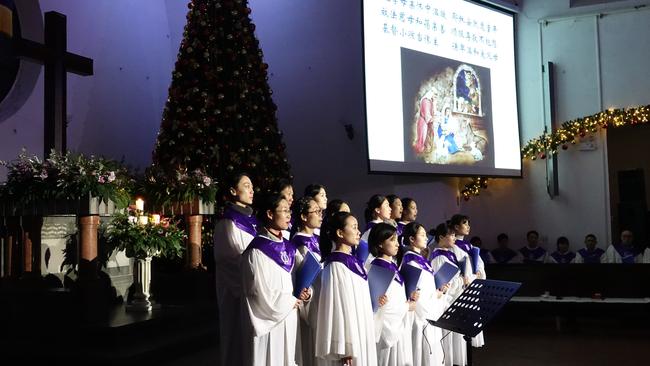‘All is calm’ — Christmas carol services could reduce your stress
Science suggests the love, joy and nostalgia of singing at evensong can leave those who attend carol services less stressed and ‘significantly more tranquil’ than when they entered.

If you’ve enjoyed a carol service this Christmas, you may have been struck by the beauty of the music or the community spirit of the festive season.
You may also have noticed physical changes in your body. Researchers have found that those who attend religious services that focus on sung music experience a fall in their heart rate, leaving them less stressed and “significantly more tranquil” than when they entered.
The results of a study showed that attendees “recorded an overall declining heart rate across the 47-minute duration … and completed it with a distinctly lower rate than when they began”.
The research, highlighted in a book called Music and Spirituality, said the findings from an evensong service were “a reliable indicator that participants became calmer and more at peace, and less agitated or stressed” as the service went on and that, by the end, “their state was significantly more tranquil than when it began”.
A separate study may be able to explain why. Research by Victoria Costa, a theology PhD candidate at the University of St Andrews, studied some of the most popular Christmas carols.
She found that some can induce a strong “sense of nostalgia”, citing In the Bleak Midwinter with its alternating pattern of major and minor chords and lyrics that speak of a time “long ago”. She also found that carols such as O Come, All Ye Faithful capture a sense of “love and joy” and also of “movement … towards something new”.
The first study, by Kathryn King, who was a musicologist at the University of Oxford at the time, was conducted by immersing participants in a virtual reality (VR) film. An audio-visual recording was made of a normal evensong service in the chapel of Magdalen College, Oxford. The singing at evensong is typically led by a choir, with the congregation sometimes invited to join communal hymns.
A VR film was used to ensure that all participants experienced the same service from the same vantage point. The service was recorded in a way that mimicked the experience of hearing the music coming from all around you.
The sensors captured the participants’ heart rate, the electrical conductivity of their skin, and their gaze once per second. Participants experienced a “strong sense of presence and immersion” in the surroundings, showing that the film effectively mimicked the real thing.
The study’s author said the small project with 26 participants was intended to illustrate the “potential of physiological measures as a tool for investigating the emotional effects of music”.
Studies have found that “music can produce physiological changes associated with emotional responses”. An unexpected moment of harmony during a performance can lead to an increase in “electrodermal” activity, or variations in electrical activity on the skin, while “variations in heart rate can indicate changes in arousal — excitement or relaxation — induced by music listening”, she wrote.
During the evensong service there was a “clear downward trajectory” in heart rate. The participants’ heart rates were slowest during the closing prayers and brief period of silence at the end, but did show a “temporary elevation” during each performance by the choir, indicating an “increase in arousal” during the songs.
King’s doctoral thesis, which has not been published but has been seen by The Times, is cited in a new book edited by George Corbett, a theology professor, and Sarah Moerman, a research fellow in theology and music, both at St Andrews.
It asks: “Do certain kinds of music more readily afford spiritual experiences than others? What do psycho-physiological measures — such as heart and breathing activity, electrodermal activity, and [the hormones found in] saliva samples — reveal about perceived spiritual experiences?”
Asked about translating King’s findings about evensong to other types of service including Christmas carols, Corbett said music “can help arouse particular devotional attitudes through the seasons”, adding that carols are by definition infused with “the joy of Christmas”.
He said that the music helps to “excite or arouse” feelings of spirituality or devotion, which may be visible in physiological changes to the body.
The Times



To join the conversation, please log in. Don't have an account? Register
Join the conversation, you are commenting as Logout